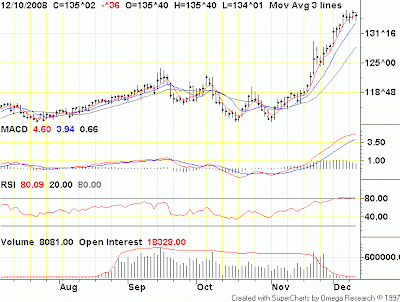Tony Crescenzi Blog
Treasuries Hit by China, CRBBy Tony Crescenzi
Street.com Contributor
2/19/2008 2:44 PM EST
U.S. Treasuries have fallen sharply today, with the yield on the 10-year note rising 12 basis points to 3.89%, its highest since early January and well above the Jan. 22 low of 3.44%. The increase threatens the nascent strength in mortgage refinancing activity, which has been surging recently.
There are a number of factors behind the weakness in Treasuries, some of which are obvious.
The root of the decline is inflation. It began today with China's consumer price index, which posted a 7.1% year-over-year gain in January, one-tenth of a percentage point higher than expected and the most since September 1996. China's inflation rate was recently as low as -1.3% (year over year) in April 2002 and +1.0% in July 2006.
These figures look worrisome when put in the context of last week's U.S. import price data, which showed that
the prices of goods imported from China surged 0.8% in January, the most since record-keeping began in December 2003 and in sharp contrast to the disinflationary influence linked to China from the 1990s until last year, when prices began to climb.
Adding to inflation worries is today's surge to a new record high for the CRB index [commodities - A.L.] and a surge in industrial materials prices. The dollar's drop is probably playing a role, but the dollar has moved mostly sideways over the past four months.
The jump in rates associated with these inflation worries has pushed the Treasury rates to levels where mortgage refinancing activity could fall sharply from recent levels. Mortgage rates had fallen far enough below the average mortgage rate paid by existing mortgage holders to spark the refi wave, but this has now changed.
It takes an incentive of about 50 basis points to encourage refi activity, but the move up in yield has reduced the average refi incentive for holders of conventional conforming mortgages down to about 25 basis points. (Mortgage rates today are closer to 5.90%, which is too close to the 6.14% average paid currently by holders of conventional conforming mortgages.)
When Treasury rates rise, holders of mortgage securities expect refis to drop, meaning that they expect their mortgage securities to prepay at a slower pace, requiring the shedding of "duration." In other words, MBS holders expect to have fewer of their securities redeemed via prepayments, and hence they wind up overly long and need to sell Treasuries as a hedge.
The rise in mortgage rates is the biggest negative in today's developments. Rates were low for too short a time to make a real dent in the mortgage equation. With housing the economy's biggest problem, this is why in an odd way it would be better for the markets to be gloomy, as it would keep mortgage rates low for longer and help to spur significant mortgage refis and dull the impact of mortgage resets.



